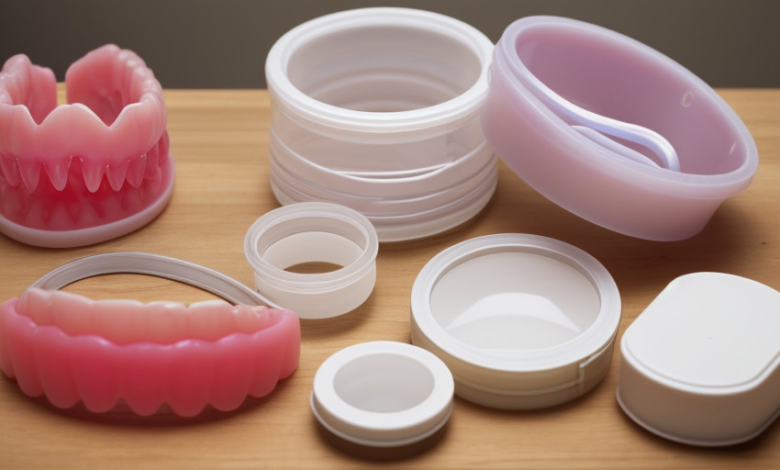What Materials Are Used in Home Denture Kits?

Dentures are versatile tooth replacement options since they use different materials based on affordability, compatibility, and durability. Picking the best material requires knowledge of the benefits that each provides and how they suit your needs best. Here are some of the materials commonly used in at home dentures:
Acrylic
Acrylic, composed of polymethyl methacrylate compounds, is a versatile plastic material that generates casts produced in different colors. Composite acrylic is the preferred material for dentures and is heat-cured or cold-cured to form the denture base plate. Acrylic dentures are easy to wear since the mold is easily customizable to fit with the gum lining. The material is affordable for patients who want to replace missing teeth with removable dentures.
Acrylic is lightweight, making it easy to adjust and shape. It offers a practical solution to patients with sensitive gums. The different colors available for acrylic resin provide a convenient way to match your dentures with your teeth’s natural colors. Since it is lightweight, it is more prone to breaks and degradation with long-time use. Patients who choose acrylic at home dentures may need to replace them every few years.
Porcelain
Porcelain is a ceramic material made by mixing kaolin, feldspar, and quartz in a heated kiln. This material has the closest match to tooth enamel in terms of color and texture. Porcelain dentures must use an acrylic or nylon base for a precise fit for a patient who needs full dentures.
Porcelain is stronger than acrylic and withstands chewing and talking, lasting for multiple years with minimal maintenance needs. Porcelain is resistant to staining and easy to maintain. The heating process in porcelain alters its composition to provide a durable material.
Alloy Metals
Dentures use alloy metals rather than one metal component since alloys offer better biocompatibility. Biocompatibility is a material’s ability to be integrated into the human body without any harmful side effects. A common alloy used in denture frameworks is a chrome and cobalt alloy. The alloy is lightweight and durable and allows for a comfortable fit if produced with precision tools.
Chrome cobalt alloys create the base for partial dentures, making them strong and durable with low weight for adequate comfort. They are more visible due to the difference in color between the gum tissue and the alloy metal. The alloy resists corrosion and safeguards the patient from irritation and inflammation.
Other alloys like gold, stainless steel, nickel, and silver provide alternatives to patients who want either more durability or premium denture replacements. Titanium is a suitable alternative for patients suffering from allergies and other adverse reactions to metal alloys. These options can be more expensive than chrome cobalt fits.
Nylon Polymer
Nylon polymers are a group of thermoplastics melted to mold their shape. They are more flexible and malleable than acrylic and fit more snugly into the gums. Nylon polymers are suitable materials for the denture frame and their translucency gives them a discreet quality for patients that do not want conspicuous frames. They are also hypoallergenic which safeguards patients from allergic reactions.
Nylon polymers rank in between acrylic and metal dentures in terms of durability and affordability. They need less material to offer the same level of rigidity as acrylic polymers but are difficult to forge and require more time to create a custom fit. They are also stain-resistant and last for multiple years before needing replacement.
Pick a Suitable Material for at Home Dentures
Assess your oral health and choose the best type of denture for your needs. Determine whether you want partial or full dentures, and then pick a material that will minimize any risks of irritation and allergic reactions. Search for at home dentures that suit your biocompatibility and budget needs.



